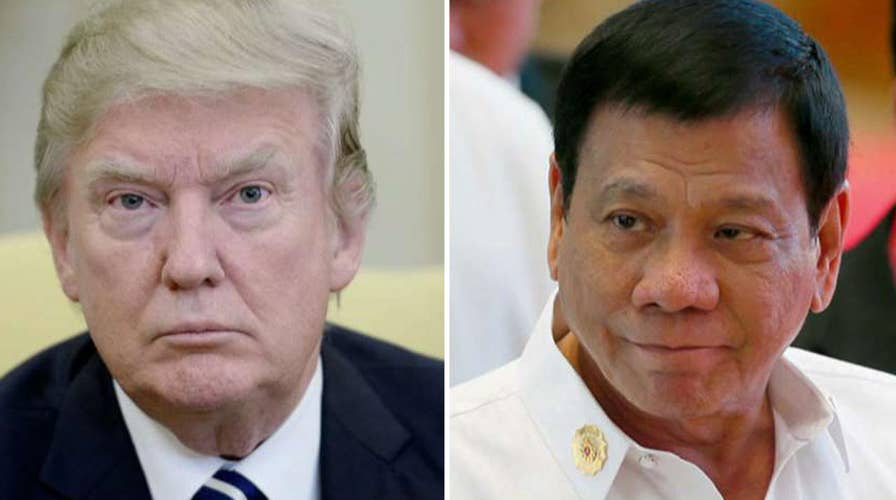Trump invites controversial Philippines leader to WH
President Rodrigo Duterte criticized by human rights groups
U.S. President Trump has invited Philippine leader Rodrigo Duterte to Washington to "to discuss the importance of the the United States-Philippines alliance," the White House said late Saturday.
The administration's statement did not mention a timetable for a possible visit by Duterte, who has been criticized by human rights groups for presiding over extrajudicial killings of suspected drug dealers and users as part of Manila's drug war. However, Trump and Duterte are expected to meet in November at the East Asia Summit and the U.S.-ASEAN Summit.
Trump's chief of staff, Reince Priebus, said Sunday the friendlier ties are needed due to the military threat posed by North Korea.
"The purpose of this call is all about North Korea," Priebus told ABC's "This Week." "It doesn't mean that human rights don't matter."
Duterte has taken a friendlier attitude toward Trump than he had toward President Barack Obama, who he once asked to "go to hell" for criticizing the Philippine leader's bloody anti-drug crackdown. During Obama's final months in office, the Philippine president moved to build closer economic ties with China and Russia while repeatedly threatening to end his nation's longstanding military alliance with the U.S.
Duterte's apparent dislike for Obama began when the U.S. State Department expressed concern over his drug war — which has left thousands of suspects dead — and asked Philippine government officials to take steps to stop extrajudicial killings.
At one point Duterte suggested he may even move to abrogate a 2014 defense agreement that allows U.S. military access to five Philippine military camps.
He has walked back most of those threats but has proceeded with his efforts to align closer with China.
On Sunday, three Chinese navy ships, including a guided-missile destroyer and a guided-missile frigate, were welcomed in Davao city, Duterte's southern hometown, by officials, including presidential daughter and city Mayor Sarah Duterte, military officials said.
Asked if the rare Chinese naval visits were a sign that Duterte was backing away from Washington, Department of National Defense spokesman Arsenio Andolong said: "We are not veering away from the U.S. but rather we are expanding our relations with our fellow nations in the global community."
Philippine presidential spokesman Ernie Abella said without elaborating that concern over North Korea came up in Trump's talk with Duterte.
Priebus indicated that the issue was Trump's primary concern, citing a North Korean threat "so serious" that it will require cooperation from Asian countries in the region. "So if something does happen in North Korea, ... we have everyone in line backing up a plan of action that may need to be put together with our partners in the area," he said.
Duterte suggested in a news conference Saturday that the Trump administration should back away from an intensifying standoff with North Korea, not in surrender, but to avoid risking a nuclear holocaust that could smother Asia.
"It would be good for America to just restrain a little bit and if I were President Trump, I'll just back out, not really in surrender and retreat, but just to let the guy realize that, 'Ah, please do not do it,'" Duterte said.
Washington, he said, should not play into provocations of North Korean leader Kim Jong Un.
"It behooves upon America, who wields the biggest stick, just to really be prudent and patient. We know that we are playing with somebody who relishes letting go of his missiles and everything," Duterte said.
The Associated Press contributed to this report.













































